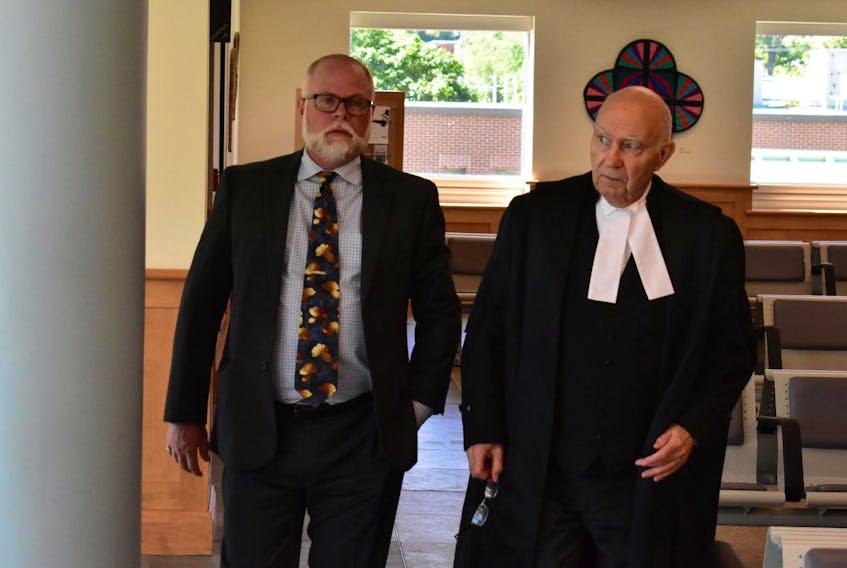BRIDGEWATER — Crown attorney Roland Levesque spent the better part of Thursday afternoon asking the complainant about her relationship with former Bridgewater police chief John Collyer.
The young woman’s testimony in Nova Scotia Supreme Court culminated in a graphic description of a sexual assault, which was alleged to have taken place in May 2016, when she was 17.
Collyer, a 26-year police veteran, lost his job following allegations that he sexually assaulted and sexually exploited a teen girl three years ago. He has pleaded not guilty to both charges.
Due to a publication ban on the complainant’s identity, many of the specifics relating to Collyer and the teen’s relationship cannot be shared.
However, through Levesque’s questioning, the complainant noted her family became very close with Collyer and his wife shortly after moving to Bridgewater a decade ago.
The complainant stated the Collyers became like “second parents” to her and that, through various activities, she spent time with the couple both individually and together.
Overall, the complainant testified Collyer treated her well and was a support for her entire family before the alleged incident.
After asking dozens of questions to establish Collyer’s relationship to the complainant, Levesque then honed in on the sexual assault alleged to have happened in May 2016.
The alleged assault
The complainant said Collyer picked her up from her house, as he often did, and proceeded to run errands before going for a drive.
On the way to their destination, said the complainant, she and Collyer chatted before he changed the subject.
She testified that he asked her if she had ever made herself orgasm, which she answered, and he placed his hand between her legs while driving.
The complainant said Collyer penetrated her, withdrew, licked his fingers and said “you taste sweet.”
When asked by Levesque if Collyer had given her any indication about his intentions, she replied yes but only in hindsight and added she did not consent.
She also testified that she felt hurt and betrayed and didn’t understand why “a fatherly figure” would abuse someone who trusted them.
When asked why she didn’t tell someone, the complainant said she didn’t think anyone would believe her.
Facebook conversations
The Crown attorney then switched his line of questioning to the nearly 600 Facebook messages recovered by the Serious Incident Response Team’s investigation through an MLAT, a type of international information agreement.
The complainant testified that she often communicated with Collyer through the app and he eventually asked her to delete their conversation history.
Levesque presented several pages of text to the complainant, asking if, as suggested by one of Collyer’s messages, she had ever played truth or dare with him.
She said she had not.
Several of Collyer’s messages read out during Wednesday’s proceedings described the teen as “hot” and mentioned “dirty limericks” and “foot rubs.”
She said she only deleted the messages once she got legal approval; all but 60 messages on Collyer’s profile were also deleted.
But as Sgt. Gord Vail, the case’s lead investigator previously testified, it is not possible to identify who erased the messages or when.
Continuation
And on a day when the complainant took the stand, time — or the lack thereof — emerged as another storyline.
Levesque raised concerns about the trial’s timeline halfway through the day’s proceedings, stating he wasn’t sure if the trial would wrap up by Nov. 3 — a deadline set by the Jordan decision.
The Jordan decision states that Supreme Court trials must be completed within 30 months of the charge being laid and is meant to ensure the accused’s charter right to a trial within a reasonable time.
Given only six days were set aside for the trial, he said, time was running out.
Although he was unavailable to take questions, Levesque had previously addressed reporters about his concerns.
“In regards to the timing of the trial and how it’s presently unravelling, we are running behind schedule,” he told reporters.
“We’re always concerned about timelines. Having this 30-month schedule imposed upon us always make us wary of where we are in the process.”
Levesque informed Justice Mona Lynch in court that the complainant’s testimony would continue into Friday and, in addition to presenting more witnesses, he intended to show a five-hour videotaped statement.
Ultimately, the court was able to secure another week in September for the trial, possibly alleviating time constraints.
The trial will continue Friday.
RELATED: Deleted, missing evidence comes to fore of Bridgewater police chief’s sexual assault trial









